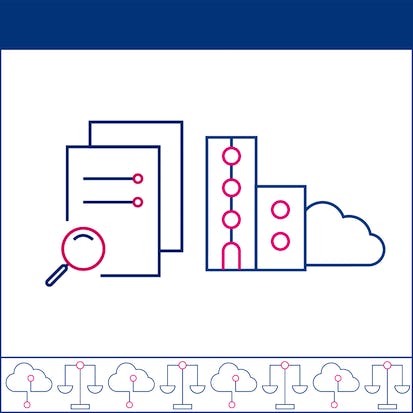- Level Foundation
- المدة 16 ساعات hours
- الطبع بواسطة Queen Mary University of London
-
Offered by

عن
Have you ever wondered how a police officer in Europe can obtain evidence from a cloud provider in the USA? Or whether a major cloud provider might abuse its market power? Or in which countries cloud providers pay taxes? If so, then this course is for you! First, we’ll look at how law enforcement agents can request access to cloud data, including data stored outside their borders. You’ll learn to advise cloud providers on responding to access requests and on dealing with potential conflicts with European Union (‘EU’) data protection law. Second, we’ll cover EU competition law, including how to define the relevant market for cloud services and to assess market power. You’ll learn to identify when cloud providers might be found to have entered into anti-competitive agreements, or to have abused a dominant position in a market. Third, we’ll look at how the income from cloud services is taxed. We’ll cover how such income is classified and which countries have the right to tax cloud providers. You’ll learn how tax principles apply to cloud services today, and how this might change in future. In short, we’ll cover how the rules of law enforcement access, competition law, and tax law apply to cloud services – and you’ll discover the practical steps that cloud providers can take to comply with their obligations.الوحدات
Lesson One: Forensic challenges in the cloud
1
Assignment
- Forensic challenges
2
Videos
- Welcome to Law Enforcement Access and the Cloud
- Introduction to forensic challenges for digital investigations in the cloud
3
Readings
- Introducing: Jessica
- Glossary of key terms for the week
- Forensic challenges in the cloud
Lesson Two: Data differentiation
1
Assignment
- Data differentiation
1
Discussions
- Reflecting on privacy and data differentiation
1
Videos
- Introduction to data differentiation
1
Readings
- Identifying different types of data
Lesson Three: Jurisdiction and voluntary/mandatory disclosure
2
Assignment
- Jurisdiction
- Voluntary and mandatory disclosures
1
Discussions
- Reflecting on voluntary disclosures
3
Videos
- Extraterritorial jurisdiction
- Voluntary and mandatory disclosures by cloud service providers
- Voluntary and mandatory disclosures and jurisdiction
1
Readings
- Law enforcement powers
Lesson Four: Cooperative legal mechanisms for LEA access to data across borders
1
Discussions
- Reflecting on mutual trust agreements
3
Videos
- Mutual Legal Assistance
- Mutual Recognition
- Mutual Trust
1
Readings
- International Cooperation
Lesson Five: Conflicts for Service Providers
2
Videos
- Conflicts for Cloud Service Providers
- Data Protection and Cloud Service Providers
2
Readings
- Conflicts for Service Providers in the News
- Law Enforcement and Data Protection
Lesson Six: Graded Quiz
1
Assignment
- Case Studies
1
Readings
- A message from your instructor
Lesson One: Competition in Cloud Markets
1
Assignment
- Cloud market power
4
Videos
- Welcome to Competition Law
- What are competitive markets?
- What is market power?
- How are markets defined?
2
Readings
- Introducing: Ian and Claudia
- Identifying market power in cloud services
Lesson Two: Application of EU Competition Law
1
Assignment
- Anti-competitive conduct
1
Discussions
- Case Study: the Apple App Store
3
Videos
- What are anti-competitive agreements?
- What is abuse of a dominant position?
- How does the law control mergers?
1
Readings
- Applying EU competition law to cloud computing
Lesson Three: Interoperability and Portability
2
Assignment
- Interoperability
- Portability
4
Videos
- What is interoperability?
- How can interoperability support competition?
- What is portability?
- Could access to data be an essential facility?
2
Readings
- Interoperability in cloud services
- Demand-side measures
Lesson Four: Platform Competition
1
Assignment
- Digital platforms
1
Discussions
- Case Study: Amazon's use of retailer data
1
Videos
- How does competition work in digital platforms?
Lesson Five: Graded Quiz
1
Assignment
- Case Studies
Lesson One: International Tax Fundamentals
1
Assignment
- International Tax Fundamentals
2
Videos
- Welcome to Week 3
- What are the basic international tax principles?
3
Readings
- Introducing: Vasiliki
- Glossary of tax terms
- International income & consumption tax fundamentals
Lesson Two: Income Classification
2
Assignment
- Income classification
- Income classification in mixed contracts
3
Videos
- How are software and hardware taxed?
- How are SaaS, IaaS and PaaS taxed?
- How are mixed cloud contracts taxed?
5
Readings
- OECD & UN Model Tax Conventions
- Taxation of software and hardware
- Taxation of SaaS, IaaS and PaaS
- Mixed contracts & 2017 OECD Model Tax Convention
- Mixed contracts
Lesson Three: Permanent establishments
1
Assignment
- Permanent establishments
2
Videos
- When is a permanent establishment created at the server country?
- When is a permanent establishment created at the user country?
2
Readings
- Permanent establishment & Article 5 of the 2017 OECD Model Tax Convention
- Permanent establishments created by the cloud provider
Lesson Four: Tax policy and cloud computing
1
Discussions
- Your opinion: Pillar One as a successful policy response to the tax challenges of digitalization
2
Videos
- What are the OECD, EU & UN digital tax policy initiatives?
- How might cloud providers be affected by the OECD digital tax policy?
2
Readings
- OECD Statement on a Two-Pillar Solution
- OECD & EU work on taxation of the digital economy
Lesson Five: Indirect Tax
1
Videos
- What indirect tax challenges does the digital economy pose?
1
Readings
- Indirect tax challenges and policy solutions
Lesson Six: Graded Quiz
1
Assignment
- Case Studies
1
Readings
- Congratulations from your instructors
Auto Summary
Are you curious about the complexities surrounding cloud computing and its legal implications? "Cloud Computing Law: Law Enforcement, Competition, & Tax" is a comprehensive course designed to address these intricate issues. This course dives into how law enforcement agencies, particularly in Europe, can access data stored by cloud providers in the USA and explores the potential market power abuse by major cloud providers. It also examines the taxation of income from cloud services across different countries. Guided by experts from Coursera, you'll gain insights into advising cloud providers on responding to data access requests and navigating conflicts with EU data protection laws. Additionally, the course covers EU competition law, helping you understand market definitions, assess market power, and identify anti-competitive practices. Taxation principles for cloud services are also discussed, including income classification and international tax obligations. This foundational course spans approximately 960 minutes and offers flexible subscription options, including Starter and Professional tiers. It is ideal for individuals interested in the legal aspects of cloud computing, whether they are beginners or professionals looking to deepen their understanding. Embark on this educational journey to master the practical steps cloud providers must take to stay compliant with law enforcement, competition, and tax regulations.

Ian Walden

Jessica Shurson

Vasiliki Koukoulioti


